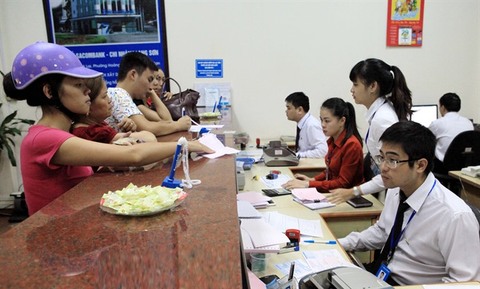[ad_1]
The State Bank of Viet Nam (SBV) needed to speed up the resolution of non-performing loans (NPLs) to bring down the bad debt ratio of the entire banking system – including both NPLs owned by credit institutions and the Viet Nam Asset Management Company – to below 3 per cent by 2020.

Transactions at Sacombank’s branch in northern province of Lang Son.
Deputy Prime Minister Vuong Dinh Hue on Tuesday made the statement at a conference to review application of the National Assembly’s Resolution 42/2017/QH and Prime Minister’s Decision No 1058/QD-TTg on the structure of credit institutions (CIs) system associated with dealing with bad debts in the 2016-20 period.
The NPL ratio at credit institutions must be reduced to a safe level according to international rules, Hue noted.
Nguyen Van Du, the SBV’s deputy chief inspector, said that after a year of implementing the regulations, the financial status of CIs had been strengthened. The charter capital of CIs by the end of June this year was estimated at VND519 trillion (US$22.3 billion), up 1.3 per cent compared to the end of 2017. The equity capital of CIs also surged by 9.1 per cent against the end of 2017 and 21.1 per cent against the end of 2016 to more than VND720 trillion.
According to Du, thanks to the regulations, measures to settle bad debts and prevent new ones from arising had been taken synchronously, contributing significantly to improving the quality of loans and reduce the bad debt ratio in the CI system.
Du said that enhanced legal frameworks in Resolution 42, which allows CIs and the Viet Nam Asset Management Company (VAMC) to rapidly repossess collateral if a borrower defaults, had helped CIs and the VAMC manage bad debts.
As of June 30 this year, CIs had handled VND138.29 trillion of bad debt according to Resolution 42, contributing to reducing the bad debt ratio in the entire banking system from 2.46 per cent on December 31, 2016 to 2.09 per cent at the end of June this year.
Despite initial positive results, the central bank has identified shortcomings during the process of resolving bad debts. Among those issues, the lack of a specialised debt trading market had restricted the efficiency of tackling bad debts.
Besides, CIs are unable to identify correctly which collateral is under dispute or take temporary emergency measures due to the lack of information. This resulted in a misunderstanding of collateral between presiding agencies, making it difficult to deal with collateral under Resolution 42.
In addition, industry insiders also said that settling NPLs had been easier since the application of Resolution 42, but detailed guidance was still needed.
The Ministry of Finance issued a document in April this year regulating the implementation of Resolution 42, but the document doesn’t provide detailed guidance on tax payment when dealing with collateral relating to NPLs, they said.
It was still difficult to sell the assets due to tax payment issues, suggesting that there should be clearer legal guidelines on paying taxes when auctioning collateral. – VNS
[ad_2]
Source link
